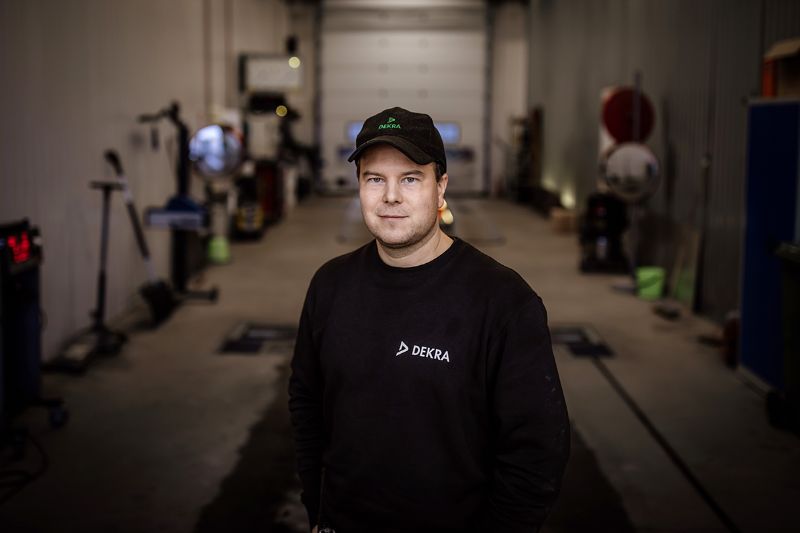Vehicle inspector
"It’s good to know that, today, you don’t need a degree in engineering to become a vehicle inspector – the qualifications of, for example, a car mechanic will suffice. If you are interested in the field, you should ask whether you can get a work placement at an inspection office. The vehicle inspector’s work is subject to a permit, so you cannot start working before having acquired the compulsory inspector’s qualification."

- Jarno Himanen
- Vehicle inspector at DEKRA Katsastus Oy.
- Completed Bachelor of Engineering degree in automotive engineering at Mikkeli University of Applied Sciences and acquired inspector’s qualification.
- Nine years of work experience in the field.
Briefly explain what you do for a living.
I work as a vehicle inspector, i.e., I inspect cars and vans and other light vehicles, such as ATVs registered for road traffic. I conduct periodic inspections and follow-up inspections on vehicles that have not passed the inspection on the first time. In addition, I manage registration and alteration inspections, vehicle registrations and insurance matters. Sometimes I also clean up and make coffee. In practice, the work is customer service all the time.
How have you ended up in the profession of your choice?
Earlier, I worked at a car repair shop for 10 years, but I stopped working there and focused on farming on my own farm. It wasn’t long after I had left my work at the repair shop that I received a phone call from an inspection station, and they offered me a job. I thought about it for a couple of weeks and then took the job. I’ve always had two jobs at the same time. And even now, I’m cultivating land in the summer and inspecting vehicles in the winter.
Describe your typical working day or week.
The working day at the inspection station begins at 8.30 a.m. and ends at 4 p.m. I don’t necessarily look at the next day’s timetable in advance unless there’s something specific coming up. If the calendar is fully booked, I know that I’ll spend my day doing inspections only. However, registrations usually need to be done between them. There are more routines in this work than in a repair shop. But the good thing is that, if I have any work concerns, they are left at the workplace when I close the door behind me at the end of the day.
What kind of work environment or working hours do you have?
The inspector’s work is fairly clean indoor work, but there is a lot of noise and sometimes also dust in the hall. The inspections are carried in an indoor hall. I pop out just to pick up the cars waiting for an inspection. Registrations and other paperwork are carried out in the office. In practice, we work with computers and mobile phones all the time. We carry the phone with us in inspections and use it to record all the data as the inspection progresses. When working with cars, there’s always a small risk of an accident. During the working day, I wear safety shoes in case my toes get jammed somewhere.
What kind of competence or qualities are required in the profession?
Experience of repair shop work is a big advantage. If you know how to repair cars, you can also inspect them. When inspecting vehicles, you need to carry out your work with great care and do customer service from start to finish. Sometimes customers may ask a lot of questions about everything, and you need to be able to give advice. Sometimes this work requires a lot of patience and pressure tolerance.
What is the best thing about your profession?
The best parts of this job are regular working hours and the fact that you don’t need to worry about your work outside the working hours. Another good thing are the colleagues if you have the opportunity to work at an inspection station with several employees. You can then ask your colleague for advice at any time.
What are the downsides of the profession or what seems challenging?
On the other hand, working at a one-person inspection station can be lonely, as there is plenty of work and the timetables are busy. Although many things are today processed electronically in this profession, the workload still seems to be growing. Many test devices feed the data directly into the system. But then the devices are more complex, and running applications takes more time than before.
What would you tell a person considering the profession of a vehicle inspector?
It’s good to know that, today, you don’t need a degree in engineering to become a vehicle inspector – the qualifications of, for example, a car mechanic will suffice. If you are interested in the field, you should ask whether you can get a work placement at an inspection office. The vehicle inspector’s work is subject to a permit, so you cannot start working before having acquired the compulsory inspector’s qualification.
How do you see the future of your profession?
Cars will need to be inspected in the future as well, so I believe there will be work in the field. Electric cars bring some more challenges to the work, but they are inspected like any other cars. The Finnish car fleet is becoming older year by year, as Finns drive relatively old vehicles. The future will show how things change.
Photo: Ilona Savitie
